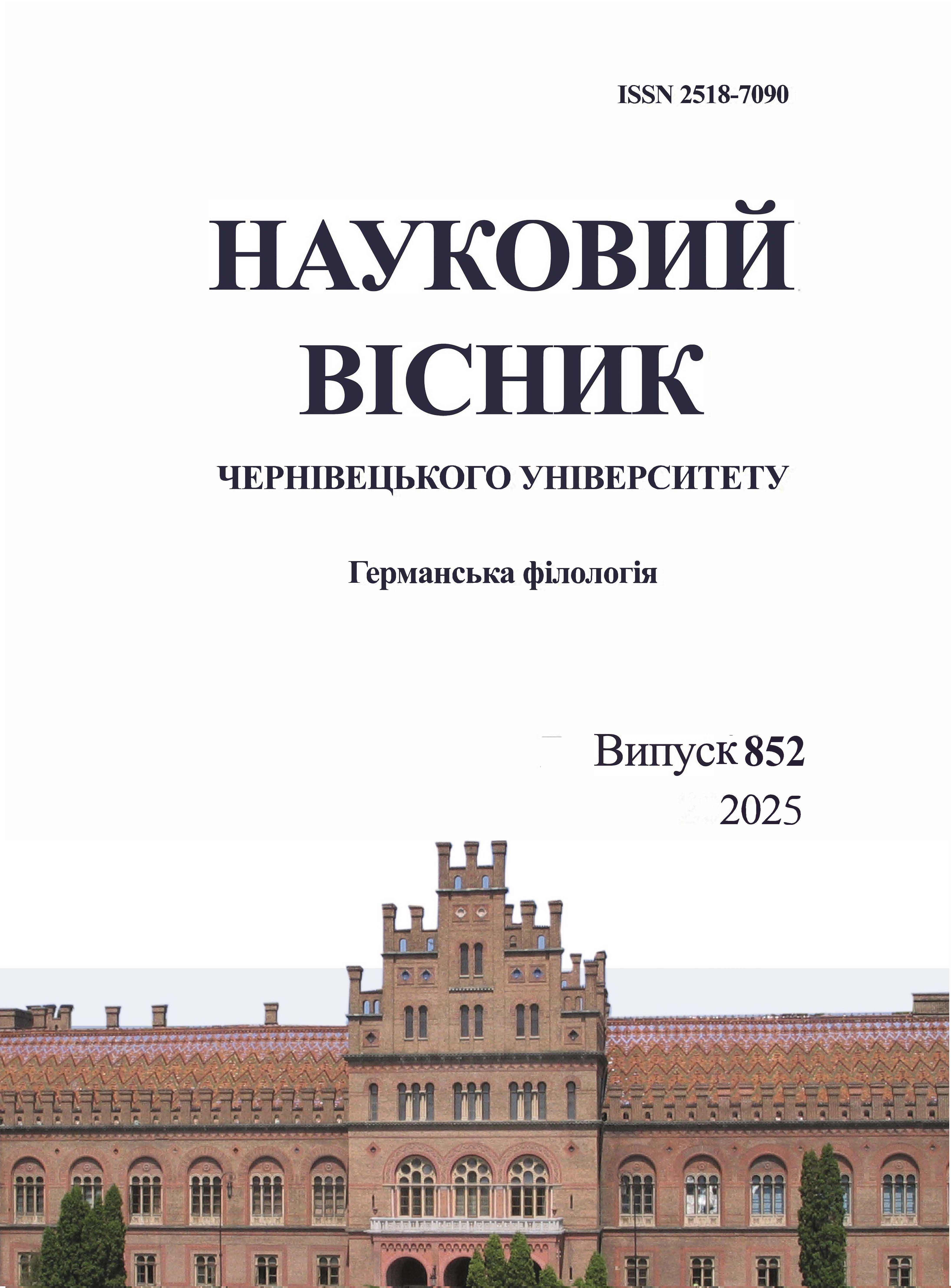PECULIARITIES OF LEXICO-SEMANTIC TRANSFORMATIONS APPLICATION IN THE “BREAD” BY WOLFGANG BORCHERT'S TRANSLATION
DOI:
https://doi.org/10.31861/gph2025.852.116-123Keywords:
lexical-semantic transformations, translation, the German language, literary textAbstract
The present article is devoted to the study lexical and semantic transformations usage applied in the process of art work translation, which is characterized by conciseness, depth of content and expressive emotionality and is a special difficulty for translation.
The article deals directly with the concept of translation transformation, the interpretation of which has been proposed by various scientists; approaches to their classification are analyzed; the use of lexical and semantic transformations in the process of translating V. Borchert's German short story "Bread" performed by Volodymyr Vasyliuk into Ukrainian is highlighted.
Solving the set tasks was carried out using such research methods as theoretical and comparative analysis, generalization of scientific and educational and methodological literature on the problems of translation studies, and the continuous sampling method for collecting linguistic facts.
Based on the fact that in the general context translation transformations are an integral part of the translation process which allows for adequate rendering the content and work style while preserving its emotional and cultural saturation, in the process of the analysis of the selected story it was established that various lexical-semantic translation transformations were applied in the translation process, namely, synonymous substitution, contextual substitution, calque, compression, decompression, permutation, transposition, concretization and generalization of meaning. Therefore, it was decided to clarify the essence of each one separately. In addition, the author exemplified such cases when in one sentence it is possible to observe the application of several lexical-semantic translation transformations at the same time.
Summarizing the results of the research, we can conclude that translation is a difficult process that is not limited to the mechanical transfer of content from one language to another, but is a creative process in which the translator becomes a co-creator of the text. Lexical and semantic transformations play a major role in preserving the communicative function of the text, allowing to avoid a literal translation, which can cause a violation of the translation integrity or non-authenticity. Therefore, the success of the translation directly depends on the skillful application of lexical-semantic translation transformations, which allow you to preserve the meaning and adapt it to the peculiarities of the translated language, preserve stylistic features and convey the content more accurately.
Downloads
References
СПИСОК ЛІТЕРАТУРИ
Гудманян А. Г. Практичний курс перекладу : підручник за ред. І. М. Баклан. Київ : КПІ ім. Ігоря Сікорського, 2022. 180 с.
Задорожна А. Перекладацькі трансформації як засіб досягнення еквівалентності перекладу. Актуальні питання гуманітарних наук. 2020. №27. С. 57-63.
Корунець І. В. Теорія і практика перекладу (аспектний переклад) : підручник. Вінниця : Нова Книга, 2017. 448 с.
Максімов С. Є. Практичний курс перекладу (англійська та українська мови). Теорія та практика перекладацького аналізу тексту : навч. посіб. Київ : Ленвіт, 2012. 203 с.
Маски: Оповідання письменників ФРН. Київ: Дніпро, 1979. C. 38-40
Селіванова О. О. Світ свідомості в мові : монографія. Черкаси : Ю. Чабаненко, 2012. 488 с.
Borchert W. Das Brot. URL: https://teachsam.de/deutsch/d_literatur/d_aut/bor/bor_das_brot_txt.htm
REFERENCES
Borchert W. Das Brot. URL: https://teachsam.de/deutsch/d_literatur/d_aut/bor/bor_das_brot_txt.htm
Hudmanian, A. H. (2022). Praktychyi kurs perekladu [Practical course of translation]. I. M. Baklan (Ed.). Kyiv, National Technical University of Ukraine «Igor Sikorsky Kyiv Polytechnic Institute» Publ., 180 p. [in Ukrainian]
Korunets, I. V. (2017). Teoriia i praktyka perekladu (aspektnyi pereklad) [Theory and practice of translation (aspect translation]. Vinnytsia, Nova Knyha Publ., 448 p. [in Ukrainian]
Maksimov, S. Ye. (2012). Praktychnyi kurs perekladu (anhliiska ta ukraiinska movy). Teoriia ta praktyka perekladatskoho analizu tekstu [Practical course of translation (English and Ukrainian languages). Theory and practice of translation analysis of the text]. Kyiv, Lenvit Publ., 203 p. [in Ukrainian]
Masky: Opovidannia pysmennykiv FRN [Masks: Stories by German Writers]. Kyiv, Dnipro Publ., 1979. pp. 38-40 [in Ukrainian]
Selivanova, O. O. (2012). Svit svidomosti v movi [World of consciousness in language]. Cherkasy, Yu. Chabanenko Publ., 488 p. [in Ukrainian]
Zadorozhna, A. (2020). Perekladatski transformatsii yak zasib dosiahnennia ekvivalentnosti perekladu [Translation transformations as a way of achieving translation equivalence]. Current Issues of the Humanities, issue 27, pp. 57-63. [in Ukrainian]






